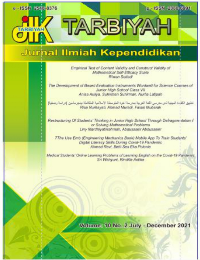Empirical Test of Content Validity and Construct Validity of Mathematical Self-Efficacy Scale
DOI:
https://doi.org/10.18592/tarbiyah.v10i2.4341Abstract
The purpose of the study is to examine the instrument content validity and it’s construct validity of the mathematics self-efficacy scale based on valid dimensions. This research is part of the research on the effect of the number of scale categories on the accuracy of the prediction validity of the mathematics self-efficacy scale. The research instrument is a Likert scale questionnaire with five answer categories. Analysis of content validity using coefficient V by Aiken while construct validity uses the Confirmatory Factor Analysis method with the help of the LISREL 8.72 program. The results showed that (1) 28 of 40 items of the instrument content validity is valid in three dimensions : level, strength, and generality. (2) While 22 items out of 28 items of the instrument construct validity is proven valid as well. In conclusion, the mathematics self-efficacy scale instrument has been empirically tested valid for its content and construct validity.References
Aiken, L. R. (1985). Three Coefficients For Analyzing The Reliability And Validity Of Ratings. Educational And Psychological Measurement, 45, 131–142. https://doi.org/https://doi.org/10.1177%2F0013164485451012
Alam, S. (2018). Apa Itu Mathematics Self-Efficacy ? In Prosiding Seminar NasionaL (Vol. 04, pp. 269–277). Retrieved from https://www.journal.uncp.ac.id/index.php/proceding/article/view/1260
Alwi, I. (2012). Kriteria Empirik Dalam Menentukan Ukuran Sampel. Jurnal Formatif, 2(2), 140–148. https://doi.org/http://dx.doi.org/10.30998/formatif.v2i2.95
Andrew, S. (1998). Self-efficacy as a predictor of academic performance in science. Journal OfAdvanced Nursing, 27(3), 596–603. https://doi.org/https://doi.org/10.1046/j.1365-2648.1998.00550.x
Arifin, S., & Asdar, A. R. (2015). Profil Pemecahan Masalah Matematika Siswa Ditinjau dari Gaya Kognitif dan Efikasi Diri Pada Siswa Kelas VIII Unggulan SMPN 1 Watampone. Daya Matematis: Jurnal Inovasi Pendidikan Matematika, 3(1), 20–29. https://doi.org/https://doi.org/10.26858/jds.v3i1.1313
Azwar, S. (2018). Penyusunan Skala Psikologi. Edisi 2. Yogyakarta: Pustaka Pelajar.
Azwar, S. (2018a). Reliabilitas dan Validitas. Edisi 4. Yogyakarta: Pustaka Pelajar.
Bandura, A. (1986). The Explanatory And Predictive Scope Of Self-Efficacy Theory. Journal of Social and Clinical Psychology:, 4(i), 359–373. https://doi.org/https://doi.org/10.1521/jscp.1986.4.3.359
Bandura, A. (1997). Self-Efficacy, The Exercise of Control. New York: W.H. Freeman and Company.
Bashooir, K., & Supahar. (2018). Validitas dan Reliabilitas Instrumen Asesmen Kinerja Literasi Sains Pelajaran Fisika Berbasis Stem. Jurnal Penelitian Dan Evaluasi Pendidikan, 22(2), 219–230. https://doi.org/http://dx.doi.org/ 10.21831/pep.v22i2.19590
Chao, C. N. G., McInerney, D. M., & Bai, B. (2019). Self-efficacy and Self-concept as Predictors of Language Learning Achievements in an Asian Bilingual Context. The Asia-Pacific Education Researcher, 28(2), 139–147. https://doi.org/10.1007/s40299-018-0420-3
Febriana, R. (2015). Uji Validitas Konstruk Pada Instrumen PASS (Procrastination Assessment Scale For Student) Dengan Metode Confirmatory Factor Analysis (CFA). Jurnal Pengukuran Psikologi Dan Pendidikan Indonesia, IV(3), 267–277. Retrieved from http://psikologi.uinjkt.ac.id/wp-content/uploads/2016/08/2-JP3I-Vol.-IV-No.-3-Juli-2015.pdf
Firdaningsih. (2016). Efikasi Diri dan Motivasi Berprestasi Dalam Meningkatkan Hasil Belajar Sejarah. JPPP│Jurnal Penelitian Dan Penilaian Pendidikan, 1(1), 47–60. https://doi.org/10.22236/JPPP
Ghozali, I & Fuad. (2014). Structural Equation Modeling, Teori, Konsep dan Aplikasi dengan Program LISREL 9.10, Edisi 4. Semarang: UNDIP.
Ghufron, M. N., & Suminta, R. R. (2013). Efikasi Diri dan Hasil Belajar Matematika: Meta-Analisis, 21(1), 20–30. https://doi.org/https://doi.org/10.22146/bpsi.9843
Guven, B., & Cabakcor, B. O. (2013). Factors in fluencing mathematical problem-solving achievement of seventh grade Turkish students. Learning and Individual Differences, 23, 131–137. https://doi.org/10.1016/j.lindif.2012.10.003
Hartati, L. (2013). Pengaruh Gaya Belajar Dan Sikap Siswa Pada Pelajaran Matematika Terhadap Hasil Belajar Matematika. Jurnal Formatif, 3(3), 224–235. https://doi.org/http://dx.doi.org/10.30998/formatif.v3i3.128
Istiqamah, I. (2019). Validitas Perangkat Pembelajaran Konsep Pencemaran Lingkungan untuk Meningkatkan Keterampilan Komunikasi Sains Siswa SMA di Banjarmasin. Tarbiyah : Jurnal Ilmiah Kependidikan, 8(2), 117. https://doi.org/10.18592/tarbiyah.v8i2.3235
Kusrini., Manoy, J. T., Susanah., & Wijayanti, P. (2014). Strategi Pembelajaran Matematika. Edisi 2. Tangerang Selatan: Universitas Terbuka.
Mardapi, D. (2012). Pengukuran penilaian dan evaluasi pendidikan. Yogyakarta: Nuha Medika, 45.
Naga, D. S. (2013). Teori Skor Pada Pengukuran Mental. Jakarta: Nagarani Citrayasa.
Purnama, A., Wijaya, T. T., Dewi, S. N., & Zulfah, Z. (2020). Analisis Buku Siswa Matematika SMA dari Indonesia dan China Pada Materi Peluang dan Statistik. Jurnal Cendekia: Jurnal Pendidikan Matematika, 4(2), 813–822. https://doi.org/https://doi.org/10.31004/cendekia.v4i2.305
Risnawita, R. S. (2013). Validitas Konstruk Efikasi Diri Matematika: Analisis Faktor Konfirmatori. Quality, Journal of Empirical Research In Islamic Education, 1(2), 71–85. https://doi.org/http://dx.doi.org/10.21043/quality.v1i2.214
Rosyida, F., Utaya, S., & Budijanto. (2016). Pengaruh Kebiasaan Belajar dan Self-Efficacy Terhadap Hasil Belajar Geografi di SMA. Jurnal Pendidikan Geografi:, 21(2), 17–28. Retrieved from http://journal.um.ac.id/index.php/pendidika n-geografi/index
Santrock, J. W. (2007). Remaja edisi 11 jilid 1. Jakarta: Erlangga.
Sunaryo, Y. (2017). Pengukuran Self-Efficacy Siswa dalam Pembelajaran Matematika di MTs N 2 Ciamis. Teorema: Teori Dan Riset Matematika, 1(2), 39–44. https://doi.org/http://dx.doi.org/10.25157/teorema.v1i2.548
Widodo, P. B. (2006). Reliabilitas dan Validitas Konstruk Skala Konsep Diri Untuk Mahasiswa Indonesia. Jurnal Psikologi Universitas Diponegoro, 3(1), 1–9.
Yusup, F. (2018). Uji Validitas dan Reliabilitas Instrumen Penelitian Kuantitatif. Jurnal Tarbiyah : Jurnal Ilmiah Kependidikan, 7(1), 17–23. https://doi.org/10.18592/tarbiyah.v7i1.2100
Downloads
Published
How to Cite
Issue
Section
License
Authors retain copyright and grant the journal right of first publication with the work simultaneously licensed under a Creative Commons Attribution 4.0 International License that allows others to share the work with an acknowledgment of the work's authorship and initial publication in this journal.




